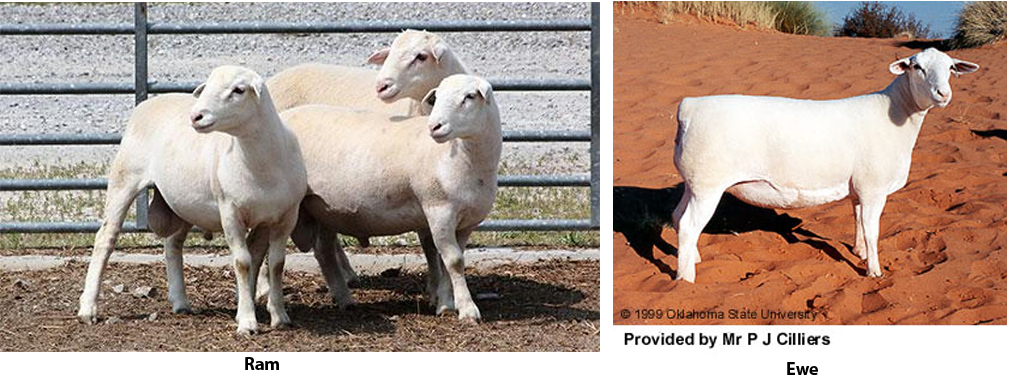Sheep Discovery: Breeds
Sheep Discovery: Breeds
Medium Wool
- Origin - Cheviot Hills of the border of England and Scotland.
- Type - Meat breed.
- Wool - Long and dense.
- Descriptors - White wool, wool-free face and legs, hornless, very erect prickled ears, black muzzle, black feet, and short legs.
- Important Traits - Easy lambing, mothering instinct, early maturity, vigorous forager, and carcass conformation.
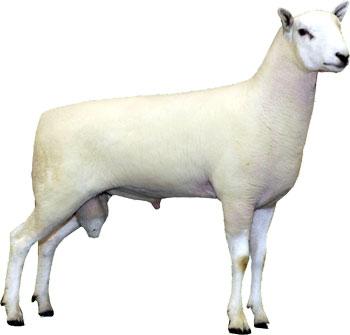
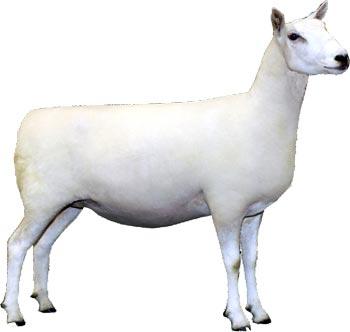
- Origin - England.
- Type - Meat breed.
- Wool - Short and dense.
- Descriptors - White wool, horns, moderate frame size, barrel shaped body, wool on head and legs, and white muzzle and feet.
- Important Traits - Carcass conformation, will breed "out-of-season", and milking ability.
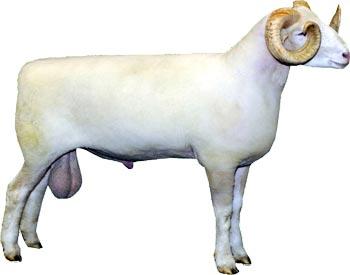
- Origin - Hampshire County in England.
- Type - Meat breed.
- Wool - Short and dense (Medium Wool).
- Descriptors - Large frame size, white wool over body, with a dark brown to black face, largely free of wool from the eyes down and black-brown legs relatively free of wool from the knees and hocks down, a white wool cap, and polled.
- Important Traits - Carcass conformation, growth rate, feed conversion, and milking ability.
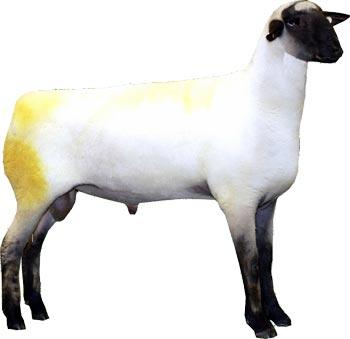
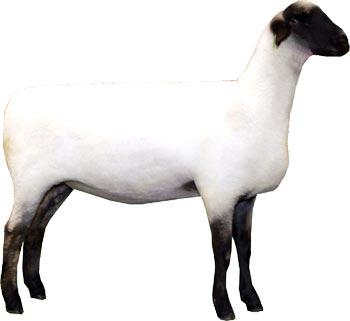
- Origin - United States.
- Type - Meat breed.
- Wool - Short and dense.
- Descriptors - Large frame size, white wool color, hornless, no wool on face or legs, black muzzle, black feet, and semi-erect ears.
- Important Traits - Carcass conformation, growth rate, lambing percentage, and wool production.
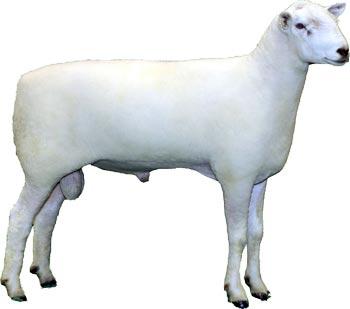
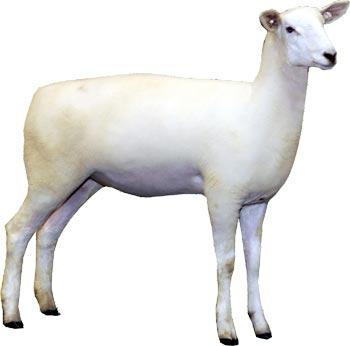
- Origin - Oxford County in England
- Type - Meat breed.
- Wool - Short and dense.
- Descriptors - Very large frame size, white wool over body with brownish-gray wool on face and a majority of the legs, white wool in the eye channels, a white top know, and hornless.
- Important Traits - Carcass conformation, heavy fleece, and lambing percentage.
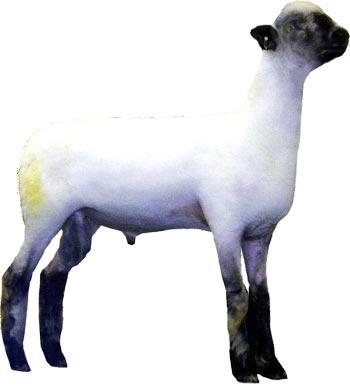
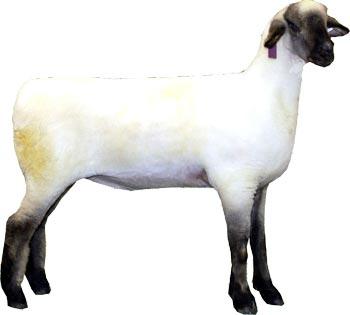
- Origin - Developed form Dorsets at North Carolina State University.
- Type - Meat breed.
- Wool - Short and ense.
- Descriptors - White wool, polled (hornless), moderate frame size, barrel shaped body, wool on head and legs, and white muzzle and feet.
- Important Traits - Carcass conformation, will breed "out-of-season", and milking ability.
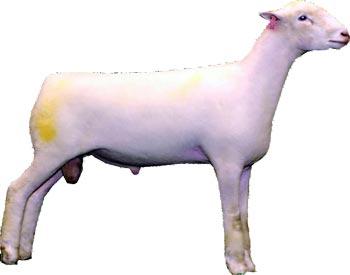
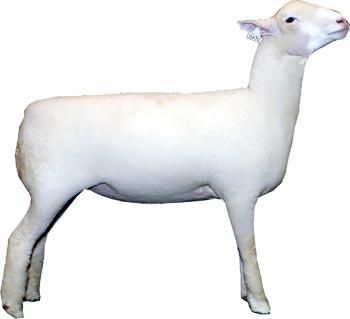
- Origin - Shropshire, England
- Type - Meat Breed
- Wool - Short and Dense (Medium Wool)
- Descriptors - Resemble a Hampshire but are typically smaller and finer boned, white wool over body, with a dark brown to black face, largely free of wool from the eyes down and black-brown legs relatively free of wool from the knees and hocks down, a white wool cap, and polled.
- Important Traits - Carcass conformation, heavy fleece, strong maternal instinct, and ample milk production.
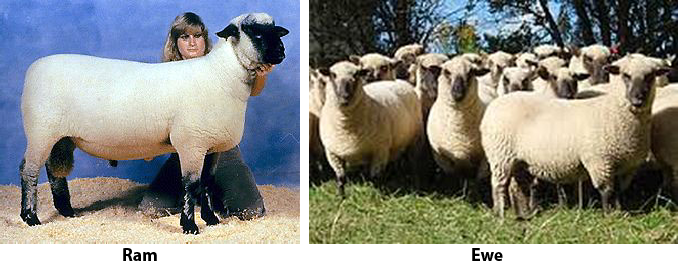
- Origin - Sussex, England
- Type - Meat breed.
- Wool - Short and loose.
- Descriptors - White wool on body with gray to brown colored wool on face and legs, black muzzle and feet, polled (hornless), small to moderate frame size, and blocky head and body.
- Important Traits - Carcass conformation, early maturity, and adaptability to varied climates.
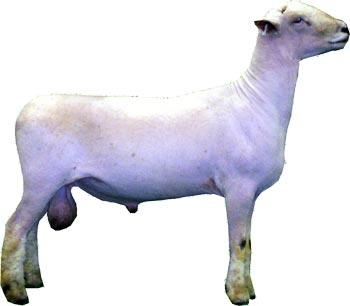
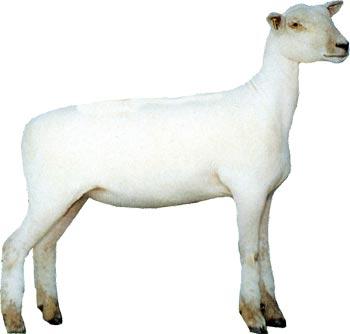
- Origin - Suffolk, England.
- Type - Meat breed.
- Wool - Short and dense.
- Descriptors - White wool over body with a black face and legs that are free of wool, polled (hornless), and a large frame size.
- Important Traits - Muscling and leanness, growth rate, and fertility.
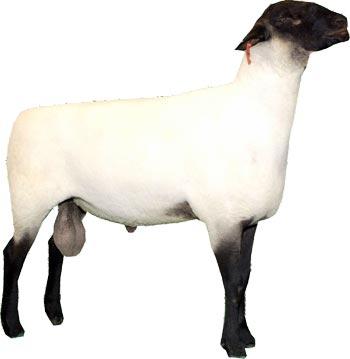
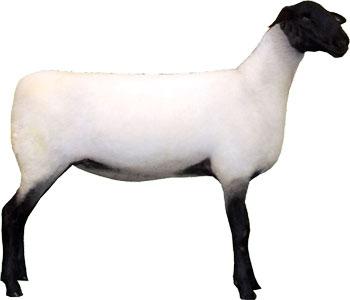
- Origin - Netherlands
- Type - Meat Breed
- Wool - Medium Wool
- Descriptors - Remarkable muscle and width, small framed, white faced, no wool on the head or legs, distinctive short, wide face with a black nose and short ears.
- Important Traits - Lean, muscular carcasses, dominant terminal sire.
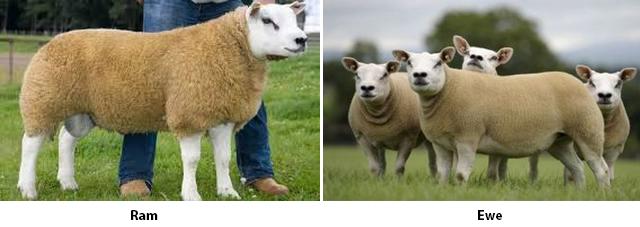
- Origin - Country of Tunisia in Northern Africa.
- Type - Meat Breed
- Wool - Short and Dense (Medium Wool)
- Descriptors - Average in size, feature reddish-brown legs and faces with pendulous ears, head and legs are free of wool.
- Important Traits - Meat quality, strong mothering instinct, ample milk production.
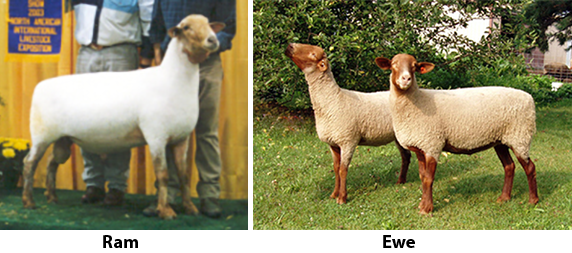
Fine Wool
- Origin - Australia
- Type - Wool Breed
- Wool - Fine Wool
- Descriptors - Thick, heavy folds in the neck, thighs, rear flanks, and behind the shoulders, white face, muzzle, and wool, large, curling horns.
- Important Traits - Wool is almost exclusively absorbed by the textile trade, wool is extremely valuable, "out of season" breeders, slow growing due to nutrient uptake dedicated to wool production.
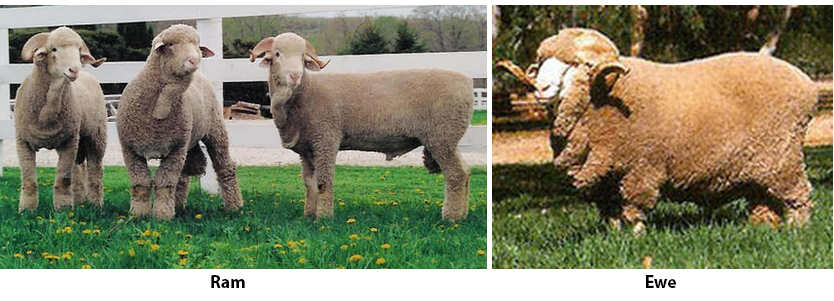
Rambouillet
Long Wool
- Origin - Cotswold Hills of Gloucester, England
- Type - Wool Breed
- Wool - Course (Long Wool)
- Descriptors - Large framed, Polled, referred to as "Gentle Giants" as they are a uniquely friendly breed of sheep, White face and legs, small black spots on face or legs acceptable, dark pigmented nose and hooves
- Important Traits - Open fleece, carried in bold locks, can mat unless kept in good condition.
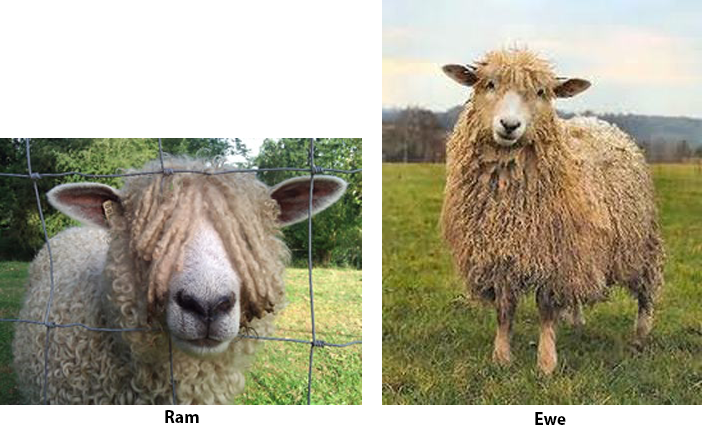
- Origin - Lincolnshire County, England
- Type - Wool Breed
- Wool - Course (Long Wool)
- Descriptors - Referred to as the largest sheep breed in the world, rectangular in form being deep bodied and showing great width, fleece carried in heavy locks, wool descending down every leg, white faces and ears.
- Important Traits - Thickest fleece of all breeds, large, lean, well-muscled carcass, average prolificacy.
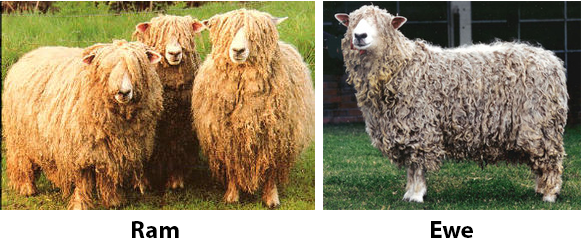
- Origin - Kent, England
- Type - Wool breed.
- Wool - Very long and coarse.
- Descriptors - White wool, white face with no wool below the eyes, black muzzle and feet, hornless, and large frame size.
- Important Traits - Wool production, muscling, and late fattening.
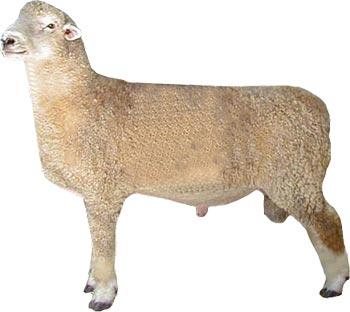
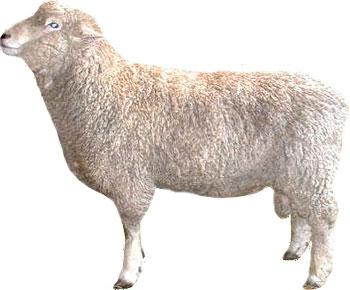
Dual-Purpose
- Origin - Developed by the U.S.D.A in Laramie, Wyoming. Original cross was between a Lincoln Ram and Rambouillet Ewe designed for the western range.
- Type - Dual-Purpose (Wool and Meat Quality)
- Wool - Crossbred (Fine Wool x Long Wool Cross)
- Descriptors - Large frame, phenomenal growth, hornless, heavy white fleece.
- Important Traits - Superior mothering ability, Heavy milk production, Carcass traits, Lambs make larger gains on grass and less feed, More pounds of wool and pounds of lamb.
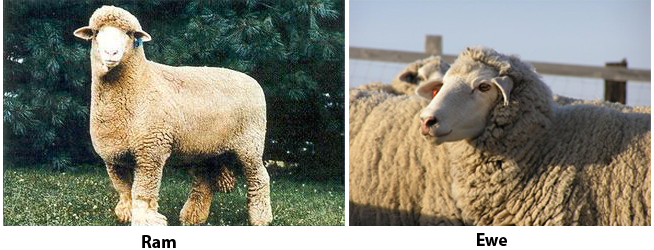
- Origin - New Zealand and Australia
- Type - Dual-Purpose (Wool and Meat Quality)
- Wool - Crossbred (Fine Wool x Long Wool Cross)
- Descriptors - Large framed, polled, wool on head and legs, dark muzzle.
- Important Traits - Dense, uniform fleece with pronounced character, high quality carcass traits.
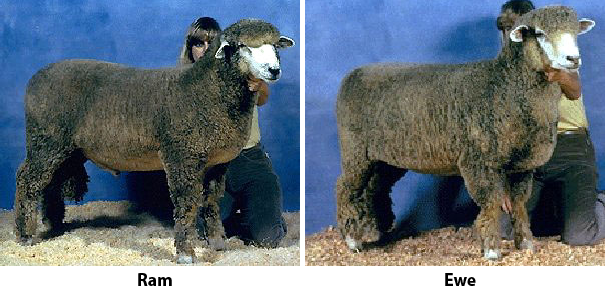
- Origin: Finland
- Type: Wool breed
- Wool: Long and open
- Descriptors: White wool color (although there are some natural colored Finnsheep), hornless, white face and legs, fine boned, and small frame size.
- Important Traits: Prolificacy, mothering ability, and wool production.
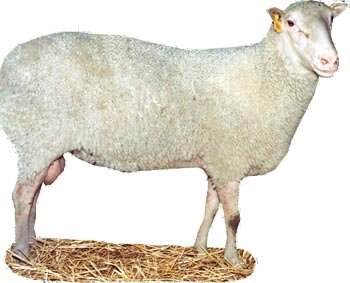
- Origin - U.S. Sheep Experiment Station Dubois, ID. Original cross (Finnsheep x Rambouillet x Dorset x Targhee).
- Type - Dual-Purpose Breed (Wool and Meat Quality)
- Wool - Medium Wool
- Descriptors - White face, legs, and wool, average body size, excellent mothers.
- Important Traits - High lifetime prolificacy, large lamb crop, ability to lamb more frequently than once per year, rapid growth rate of lambs, desirable carcass quality.
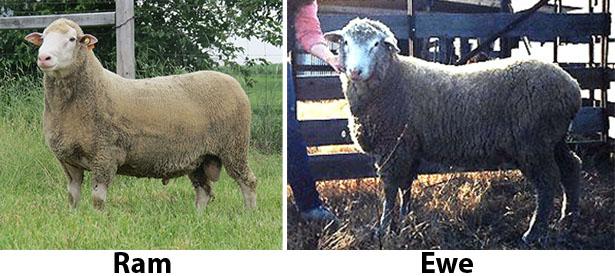
- Origin - U.S. Sheep Experiment Station Dubois, ID.
- Type - Dual-Purpose (Wool and Meat Quality)
- Wool - Crossbred (Fine Wool x Long Wool Cross)
- Descriptors - Thick, high quality fleece, open faces, white wool, face, and legs, large framed.
- Important Traits - Wool production, meat production, hardy and adaptable.
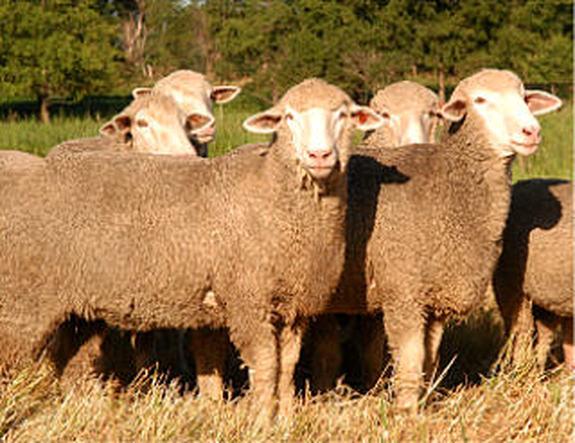
Hair
- Origin - South Africa
- Type - Meat Breed
- Wool - Hair (Slight mixture of wool and hair permissible)
- Descriptors - Black head, white body, thick, muscular frame
- Important Traits - Hardy, do well in harsh conditions, ewes are excellent mothers and heavy milkers, lambs are vigorous, reproductive efficiency, non-selective grazers.

- Origin - Maine, U.S.
- Type - Meat Breed
- Wool - Hair
- Descriptors - Wide variety of color combinations, naturally shedding haircoat, and docile.
- Important Traits - Well-muscled carcass that is naturally lean, significantly tolerant of internal and external parasites.
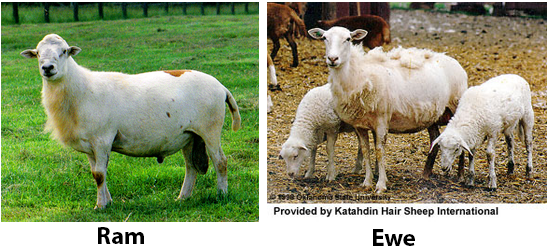
- Origin - South Africa
- Type - Meat Breed
- Wool - Hair (Slight mixture of wool and hair permissible)
- Descriptors - White head, white body, thick, muscular frame.
- Important Traits - Hardy, do well in harsh conditions, ewes are excellent mothers and heavy milkers, lambs are vigorous, reproductive efficiency, non-selective grazers.
